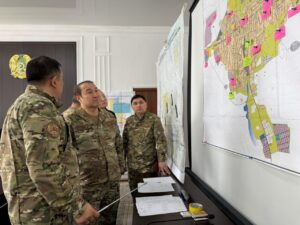ASTANA — Kazakh President Kassym-Jomart Tokayev received detailed briefings on March 28 from Zhambyl Region Akim (governor) Yerbol Karashukeyev and Minister of Emergency Situations Chingis Arinov concerning the aftermath of the earthquake that struck the region earlier that day, according to a statement from Akorda.

The government is closely monitoring the situation, with Prime Minister Olzhas Bektenov directed to ensure the prompt delivery of aid and oversee the swift restoration of damaged residential buildings and critical social infrastructure.
Earthquake and aftershock details
A 5-magnitude earthquake struck the border area between Kazakhstan and the Kyrgyz Republic on March 28 at 03.42 a.m. Astana time. The epicenter was located in Kazakhstan, approximately 323 kilometers southwest of Almaty.
The tremors were felt across several areas, including the Zhambyl Region, with varying intensities. In the city of Taraz and the town of Shu, the intensity was two points. In Merke and Kulan villages, the intensity reached five and four points, respectively.
The earthquake was also felt in Bishkek, the Kyrgyz Republic, where the magnitude was recorded at 5.5 points. The tremors lasted only a few seconds and caused weak shaking of walls and furniture, notably in multi-story buildings.
Later in the day, at 4 p.m. Astana time, a second earthquake was registered, originating in the Kyrgyz Republic. While the exact intensity is still being assessed, no casualties or further damage have been reported so far.
Damage assessment and response
Following the earthquake, the Emergency Situations Ministry reported structural cracks in 11 social facilities and 12 residential buildings across the region’s Merke and Turar Ryskulov districts. While no casualties have been reported, authorities continue to inspect affected sites to determine the full extent of the damage.
The ministry also established an operational headquarters and launched a public hotline to handle inquiries. A government-led working group, headed by the deputy minister, was also dispatched to the region to assess the situation on the ground, support local authorities, and evaluate the extent of the damage.
Bektenov emphasized the importance of keeping critical infrastructure, including social facilities, roads, and life support systems, under special control.
